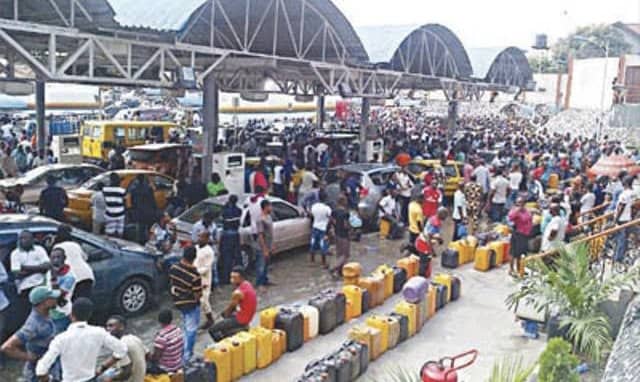Oil marketers have cited ongoing protests as the reason for suspending operations, though they reassure the public that fuel queues are expected to ease by next week.
According to The PUNCH, members of the Independent Petroleum Marketers Association of Nigeria (IPMAN), which controls around 80 percent of the country’s filling stations, remain reluctant to reopen due to the threat of violence. This hesitation has resulted in fuel shortages across many cities.
Nationwide protests, which began on August 1, 2024, are expected to continue until August 10, 2024. Despite a slight decrease in protest activities, fuel queues remain a concern. IPMAN National Publicity Secretary, Chief Ukadike Chinedu, noted that the disruptions have affected operations, with fears of attacks on stations and fuel trucks still prevalent.
“During the ENDSARS protest, the businesses of oil marketers were attacked and destroyed and the government did not pay any compensation for it. Trucks that were carrying petrol and diesel were burnt in the Warri, Enugu, Sapele, and some other axes, and the government did not pay any compensation.
“So we are being very careful now. I also told you earlier that the security agencies had advised us not to attract protesters to our stations when these stations are opened. We thought the protests wouldn’t last and we asked our people to go and work, but unfortunately, with the way things are moving, we have to wait till the end of the protest.
“That is the reason why you see many stations are still closed, particularly in locations where the protests were violent. So we urge the protesters to calm down, they have made their mark and the government now understands the plights of the Nigerian people better.”
Chinedu also mentioned that marketers are interested in seeing a reduction in the pump prices of petrol and diesel.
“The high prices of these commodities have caused their consumption to drop. People now have alternative sources and have reduced the purchase of these fuels, making our turn-around time drag and reducing profit margins,” he added.
IPMAN National Operations Controller Mustapha Zarma acknowledged the fear among marketers but promised that the situation would stabilize next week after the protests ended.
“Everybody is afraid to put their trucks on the roads now because of the protests. Nobody wants to take chances. But now that the situation is improving gradually, we have dispatched some trucks to go and bring products from the coastal depots to other parts of the country.
“However, the fuel supply situation won’t clear immediately. It should stabilize by next week. But I must state that this is dependent on the protest because no one can predict it. We also urge the protesters to suspend the exercise because we won’t gain anything by heating the polity,” he said.
In a recent development, Wale Edun, the Minister of Finance and Coordinating Minister of the Economy, disclosed that Nigeria spends $600 million monthly on fuel importation.
Edun attributed the high import costs to neighboring countries, including those in Central Africa, benefiting from Nigeria’s fuel exports.
Speaking on AIT’s Moneyline program, which aired on YouTube on Wednesday, Edun explained that this situation contributed to President Bola Tinubu’s decision to remove the fuel subsidy. The removal aimed to address the lack of clarity on the exact amount of fuel consumed domestically.
The National Bureau of Statistics reported that Nigeria’s petrol imports decreased to an average of one billion liters per month following the subsidy removal on May 29, 2023.


